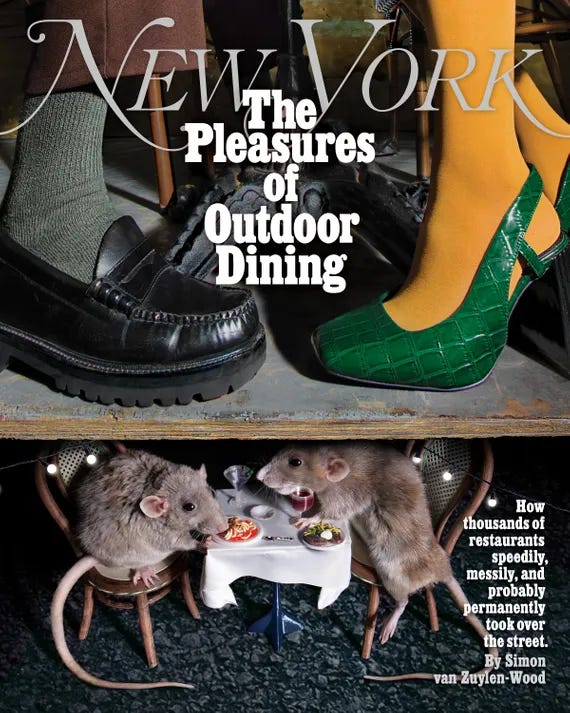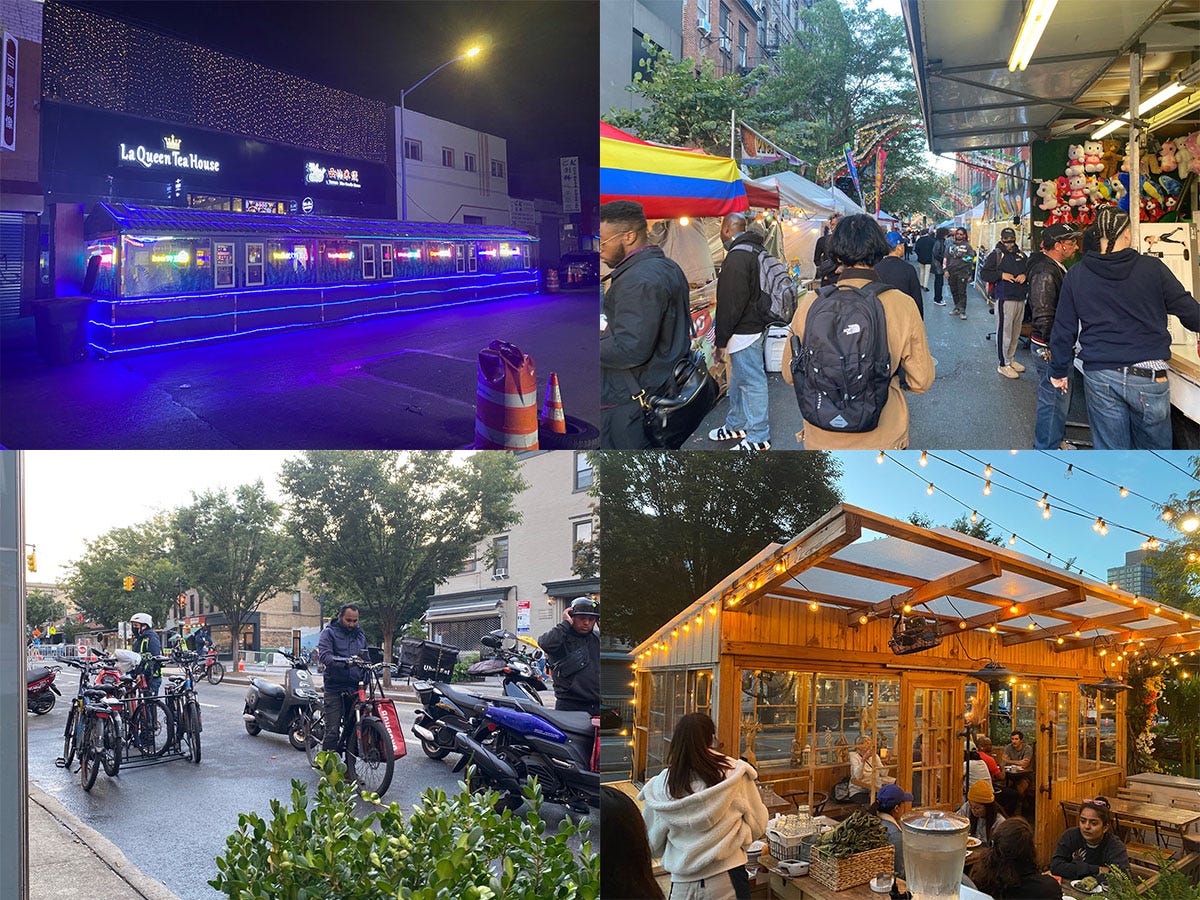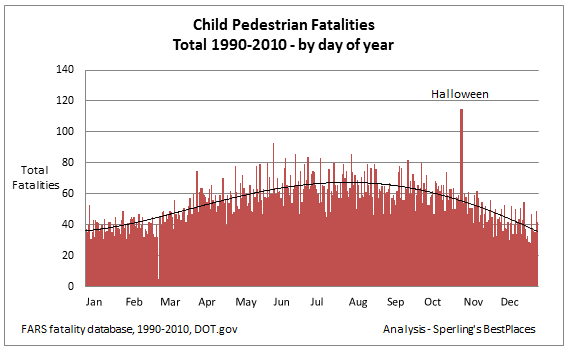New Report: Open Streets & Open Restaurants Saved NYC
DATA HIGHLIGHTS BOON TO SMALL BUSINESSES AND NEIGHBORHOODS
This week, New York City released a report on the efficacy of its interrelated Open Streets and Open Restaurants program, which sprung up in the early days of the pandemic. While Curbivore readers have long understood the positive impacts of these sorts of initiatives, it’s always valuable to have quantifiable new data showing just what a boon they can be to cities, local communities, and the mom and pop businesses and restaurants that enliven streets across the world.
In true New York fashion, the local press had a field day with the report. While the NY Times gave it a fairly level headed write-up; NY Mag / Curbed went for a more salacious angle, calling it a giveaway to restaurateurs, and running with a cover image that makes the unfounded claim its been a boon to the city’s rodent population.
Clickbait aside, the report had four key findings:
Open Streets corridors significantly outperformed nearby control corridors on three key metrics (sales growth, growth in the number of restaurants and bars, and keeping businesses open).
Sales growth at restaurants and bars on Open Streets corridors significantly outpaced sales growth in the boroughs that the corridors are in.
On Open Streets corridors, a higher percentage of restaurants and bars were able to stay in business during the pandemic than across the rest of the same borough.
All Open Streets corridors saw faster growth in the number of new restaurants and bars that opened during the pandemic when compared to the rest of the same borough.
For a city that prides itself on vibrant pedestrian life and a robust dining scene, the implementation of these programs meant life or death for a neighborhood and its businesses. To wit, corridors without open streets stabilized at 19% below baseline, while those with them came out 29% ahead of their pre-pandemic numbers. Whether you’re measuring sales, new business formation, store closures or anything else - it’s clear these programs work.
That said, there’s always room for improvement. On a recent visit to the Tri-state, it was clear that while some outdoor dining sheds were beloved neighborhood fixtures, others had grown grimy or were completely abandoned. To counter charges that this is a giveaway to the private sector, the city could consider charging fees to use the public space. While pre-pandemic permits at times onerously ran into the tens of thousands of dollars, a municipality could easily charge the average parking rate multiplied by the average occupancy rate, and still come out ahead as there’d be lower enforcement costs. And by adding back fees, restaurateurs that have stopped using their dining sheds would find it no longer economical to leave them on the street abandoned.
Looking ahead, there’s still work to be done. In cities across the globe, we’re seeing open street / dining programs wound down or diminished. It’s not just a public sector issue, as private parking lots that were suddenly vibrant with shoppers and diners are being put back to lowly car storage uses as well. And in NYC specifically, there’s naturally now an internecine political fight over which department should maintain the program going forward. Reports like these show just how important it is to not only keep these programs alive, but to keep expanding and improving them.
HOT INDUSTRY NEWS & GOSSIP
Argo a no-go: After investing over a billion dollars into the self-driving startup, Ford and VW are winding down Argo AI. While some of its more than 2,000 employees will be offered jobs at one of the OEMs, it marks a serious retrenchment for the autonomous vehicle industry, which was also battered by news that the DoJ is investigating Tesla’s “self-driving” claims. There’s gloom in the UK as well, as Arrival announced its second restructuring in six months. Those headwinds aren’t stopping Intel though; the chipmaker spun out AV component maker Mobileye at a $17 billion valuation, followed by a 37% opening day pop.
Brown in the green! While Fedex continues to stumble, UPS reported it had beat its Q3 earnings estimates, sending the stock skyward. The delivery giant is on track to meet its full year estimates, which many analysts consider a good omen for the overall ecommerce economy.
Safe but ugly? Netherland’s Van Raam announces the “Balance,” an ebike the company claims is the world’s safest. Priced at €3,950 (or €1,627 without the motor,) the bike’s unusual step-through design and seat angle supposedly give riders added protection and maneuverability. But it certainly comes with some aesthetic downsides…
Finally, a use case for iOS’ new lock screens! Wondering when that next bus is due? A new app gives you a very visual cue of just how far away your ride is.
There must be something in the Charles River… Brainy Cambridge, MA made some bold moves this week; the city became one of the few in the US to remove parking minimums for residential and commercial buildings. MassDOT also moved ahead with plans to repurpose a major bridge’s travel lane to be bike-friendly. Across the country, Culver City also abolished parking requirements, and released new data on the efficacy of its earlier efforts to make its downtown core more welcoming to pedestrians and bikes. (You may recall the city’s progressive leadership at Curbivore 2022 and 2020.)
Up in smoke? This Bloomberg article on the complete history of Gopuff is a must-read. While the authors tease a Kozmo.com sized write-down, there’s certainly no way to go from a West Philly dorm room to a nationwide phenomenon without breaking a few eggs…
Moove’s groove: Nigerian fintech startup Moove raises $16.8 million to help African gig workers finance vehicles.
RI e-bikes: Transforming from the “ocean state” to an e-bike rebate, Rhode Island is working to get its citizens out of cars. Residents can get $400 or 30% off an electric bicycle, even more if they’re low income. Now, how about combining these incentives with some industrial policy to get their manufacturing re-shored?
Wasteful: We often bemoan this country’s inability to build on a budget, and the latest SF saga perfectly exemplifies it. We’d love to see more public restrooms as a curbside civic amenity, but that’s hard to do when they cost $1.7 million each. The city by the bay also has to return $15 million in federal grants for missing a deadline on its Market Street overhaul.
Dine n Dash? The real world and virtual worlds continue to merge, as DoorDash trials the ability to reserve a table at popular restaurants via its app, with the functionality powered by SevenRooms. Will users remember they need to put on pants?
Missed deliveries: Deliveroo leaves the Netherlands, and REEF pulls out of Houston.
Missed connections: Montreal’s REM transit expansion pushed back until 2023. But in SoCal, the Arrow suburban rail system opens to fanfare.
California gettin’ active: Buoyed by a budget surplus, the CTC unveiled over $1 billion in active transportation program funding. Notable projects include bike connections to LA’s A Line, a new path linking West Oakland with the Bay Bridge, bike lanes across the Coachella Valley, and more.
Very scary: Cars plus kids can be a deadly combination. With Halloween falling on a weekday, keep in mind the importance of lowering speed limits in residential neighborhoods.
Extra links: Aldi piloting in-house online delivery. Smarking and ParkHub combine to make parking giant. Helbiz acquisition of Wheels closes. Marc Lore wonders aloud. Get ready for more burgers; MrBeast seeks VC dollars. Will changes to California’s cannabis regulatory environment affect its bountiful MJ delivery market? America is so car-brained that even a tiny island in NYC’s harbor may get 200 parking spots. Philly picks Pebble. LADOT unveils largest slow street installation, followed by ambitious BLAST bikeway program. DC reveals mobility innovation district. Learn Grubhub’s tips on running a digital delivery biz.
Until next week!
- Jonah Bliss & The Curbivore Crew






